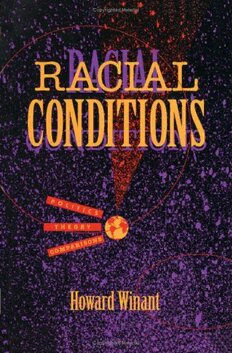
Racial Conditions: Politics, Theory, Comparisons PDF
Preview Racial Conditions: Politics, Theory, Comparisons
Racial Conditions This page intentionally left blank Racial Conditions Politics, Theory, Comparisons Howard Winant University of Minnesota Press Minneapolis London Copyright 1994 by Howard Winant Chapter 2, "The Theoretical Status of the Concept of Race," reprinted in revised form from Race, Identity, and Representation in Education, Warren Crichlow and Cameron McCarthy, eds. (New York.- Routledge, 1993); used with permission of the publisher. Chapter 6, "The Los Angeles 'Race Riot' and Contemporary U.S. Politics," reprinted in revised form from Reading Rodney King, Reading Urban Uprising, Robert Gooding-Williams, ed. (New York: Routledge, 1993); used with permission of the publisher. Chapter 7, "Hard Lessons: Recent Writing on Racial Politics," was previously published in Socialist Review 93, no. 2 (1993); reprinted with permission of Socialist Review. Chapter 8, "Racial Formation and Hegemony: Global and Local Developments," was previously published in Racism, Identity, Ethnicity, Ali Rattansi and Sallie Westwood, eds. (New York: Basil Blackwell, 1994); reprinted with permission of the publisher. Chapter 9, "Rethinking Race in Brazil," previously appeared in Journal of Latin American Studies 24, no. 1 (February 1992); reprinted with permission of Cambridge University Press. All rights reserved. No part of this publication may be reproduced, stored in a retrieval system, or transmitted, in any form or by any means, electronic, mechanical, photocopying, recording, or otherwise, without the prior written permission of the publisher. Published by the University of Minnesota Press 111 Third Avenue South, Suite 290, Minneapolis, MN 55401-2520. Printed in the United States of America on acid-free paper Third printing 2002 Library of Congress Cataloging-in-Publication Data Winant, Howard. Racial conditions : politics, theory, comparsions / Howard Winant. p. cm. Includes bibliographical references and index. ISBN 0-8166-2386-4 (hard cover : acid-free) ISBN 0-8166-2387-2 (pbk. : acid-free) 1. Race relations. 2. United States—Race relations. 3. Brazil—Race relations. I. Title HT1521.W59 1994 305.8'00973-dc20 93-30445 CIP The University of Minnesota is an equal-opportunity educator and employer. In appreciation of the work and struggle of Salman Rushdie, tireless defender of the rights of minorities and the cause of free expression. May he regain complete liberty. With gratitude to Deborah Haagens Winant, who continues to sustain those she loves. This page intentionally left blank Nao temos armas que vengam a opressao e jamais teremos, embora de- vamos lutar sempre que a nossa sobrevivencia e a nossa honra tenha de ser defendida. Mas a nossa arma ha de ser a cabega, a cabega de cada um e de todos, que nao pode ser dominada e tern de afirmar-se. Nosso obje- tivo nao e bem a igualdade, e mais a justica, a liberdade, o orgulho, a dignidade, a boa convivencia. Isto e uma luta que trespassara os seculos, porque os enemigos sao muito fortes. A chibata continua, a pobreza au- menta, nada mudou. A Aboli^ao nao aboliu a escravidao, criou novos escravos. A Republica nao aboliu a opressao, criou novos opressores. O povo nao sabe de si, nao tern consciencia e tudo o que faz nao e visto e somente Ihe ensinam desprezo por si mesmo, por sua fala, por sua aparencia, pelo que come, pelo que veste, pelo que e. Mas nos estamos fazendo essa revolucao de pequenas e grandes batalhas, umas sangren- tas, outras surdas, outras secretas, e e isto que eu faco.... [We don't have enough weapons to overcome oppression and never will, although it's our duty to fight whenever our survival and our honor have to be defended. But our weapon must be the mind, each and everyone's mind, which must not be dominated and has to assert itself. Our objec- tive is not really equality, rather it's justice, freedom, pride, dignity, good coexistence. This is a fight that will go across centuries, because our ene- mies are very strong. The bullwhip still prevails, poverty increases, noth- ing has changed. Emancipation didn't abolish slavery, it created new slaves. The Republic didn't abolish oppression, it created new oppres- sors. The people doesn't know about itself, has no conscience, nothing it does is seen, and all it is taught is contempt for itself, for its speech, for its appearance, for its food, for its clothing, for what it is. But we are making this revolution of small and great battles, some bloody, some muffled, some secret, and this is what I do....] —Joao Ubaldo Ribeiro, An Invincible Memory This page intentionally left blank Contents Preface xi 1. Introduction 1 Parti. Racial Theory 2. The Theoretical Status of the Concept of Race 13 3. Where Culture Meets Structure: Race in the 1990s 22 4. Dictatorship, Democracy, and Difference: The Historical Construction of Racial Identity 37 Part II. Racial Politics 5. Contesting the Meaning of Race in the Post-Civil Rights Period 57 6. The Los Angeles "Race Riot" and Contemporary U.S. Politics 69 7. Hard Lessons: Recent Writing on Racial Politics 85 Part III. The Comparative Sociology of Race 8. Racial Formation and Hegemony: Global and Local Developments 111 9. Rethinking Race in Brazil 130 10. "The Fact of Blackness" in Brazil 148 11. Democracy Reenvisioned, Difference Transformed: Comparing Contemporary Racial Politics in the United States and Brazil 157 Notes 171 Bibliography 181 Index 195 ix
